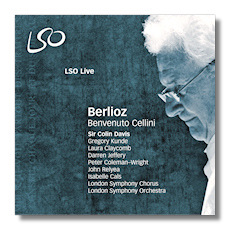
The Internet's Premier Classical Music Source
Related Links
- Berlioz Reviews
- Latest Reviews
- More Reviews
-
By Composer
-
Collections
DVD & Blu-ray
Books
Concert Reviews
Articles/Interviews
Software
Audio
Search Amazon
Recommended Links
Site News
 SACD Review
SACD Review
Hector Berlioz

Benvenuto Cellini
- Gregory Kunde (Cellini), tenor
- Laura Claycomb (Teresa), soprano
- Darren Jeffery (Balducci), bass
- Peter Coleman-Wright (Fieramosca), baritone
- Andrew Kennedy (Francesco), tenor
- Isabelle Cals (Ascanio), soprano
- Jacques Imbrailo (Pompeo), baritone
- John Relyea (Pope Clement VII), bass
- Andrew Foster-Williams (Bernadino), bass
- Alasdair Elliott (Cabaretier), tenor
London Symphony Orchestra & Chorus/Sir Colin Davis
LSO Live LSO0623
The LSO Live is one of a growing number of labels which are published by their musicians – in this case the much longer established London Symphony Orchestra. Here they are with Colin Davis, who effectively revived Berlioz' Benvenuto Cellini in 1972 when his studio recording (Philips 416955-2) not only brought the work to the attention of modern audiences, but also set a standard for performances up to which subsequent recordings (there are seven in the current catalog, including this one) have had to try and live. This time LSO Live is a release based on concert performances (it does have all the atmosphere and edge thereof) in the Barbican, London (the LSO's home) on two nights in June last year (2007).
Davis has pulled even more from his performers this time than he did 35 years ago when he had the likes of Raimund Herincx, Hugues Cuénod, Robert Lloyd and Nicolai Gedda to draw on, although the Covent Garden Chorus was not of the same standard (then) as is the London Symphony Chorus (now). For there are crucial and striking moments for the chorus – notably the end of the carnival scene in Act I. The principals have huge, almost impossible, tasks to make the level and yet nuanced impact that we must assume Berlioz wanted… this was subject matter close to his heart. By and large they do well. The only native French performer is Isabelle Cals (soprano) whose Ascanio is a triumph.
Like many 19th-century operas, there are multiple versions of Benvenuto Cellini – mostly as a result of demands by the various opera houses and companies (and indeed of Berlioz' own revisions) throughout the handful of times it was staged while Berlioz was living and able to improve it. It was called an "opéra semi-seria" and considered by the composer to be one of his finest works. The characteristic Berlioz most famously attached to Benvenuto Cellini was originality. But the failures in Paris then Weimar (where Liszt took up its cause) were used (against Berlioz) to show that he was a better orchestral than vocal writer!
The need to take conceiving, stewarding and staging even these difficult singing parts in any conductor's stride is one challenge. The other is – while doing this seamlessly – to point up the heroic role of a major artist (Cellini; and, Yes, of course, Berlioz) when surrounded by lesser creators; and to point it up unselfconsciously. Yet a third is to make the almost burlesque threads (duels, strikes and the like) work together with the serious themes. Davis is supremely well placed to do all of this. And he does. And he does so apparently effortlessly. He does so, in large part, by using the first Paris score, which emphasises music over words and actions. Lastly, what Davis has in abundance, and has in greater measure than his rival conductor(s), and probably than in his earlier version, is a grand and steady sense of the music's architecture: he does not allow himself to be swept away by moments, climaxes and set pieces. Rather, the arches and curves of the music are made to inform every scene, aria and even exchange between characters. In the end, there are perhaps fewer "fireworks" in this recording; but it's a much more satisfying experience.
The acoustic is good, though not over-roomy – even on SACD. It reflects the Barbican's "contained" (dry, almost) atmosphere; though no drama is lost or compromised as a result of this honesty. The text in French and English are in an adequate booklet that sticks to the point and yet contains much useful information about the whole enterprise beyond synopsis and artist profiles: very good value for money.
This recording, then, can be safely recommended. Apart from the earlier Davis (now available only as part of the two-dozen CD Berlioz Edition set (Philips 473936-2), only John Nelson on Virgin Classics (72435-45706-2), over three CDs but similarly priced, though not available on SACD as is the LSO Live set, represents viable competition. It's French in origin and makes a virtue out of Berlioz rhythmic insistencies. If you're new to the opera and/or looking for a good modern SACD of a slightly neglected area of the repertoire – and not only thanks to the opera's early history – then Davis' latest persuasive and authoritative account definitely fits the bill.
Copyright © 2008, Mark Sealey




















